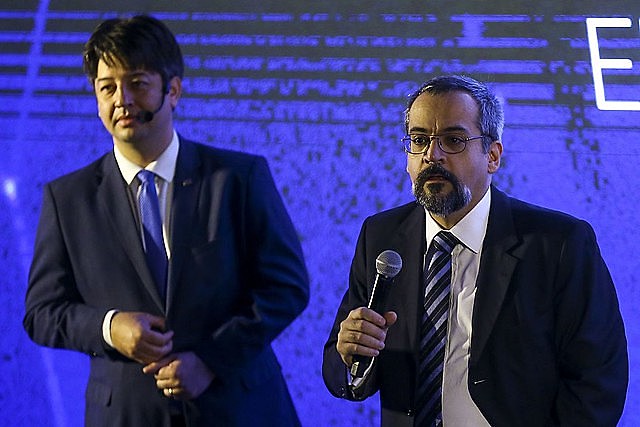The Ministry of Education of Brazil introduced on Wednesday a program to promote private investments in public universities, sparking protests among students, professors, and education activists who believe the move will not solve the pressing problem of budget cuts for higher education.
“Future-se” — or “Future Yourself” — was announced to journalists and university presidents in Brasília by the Education minister, Abraham Weintraub, and his Higher Education officer, Arnaldo Barbosa de Lima Júnior. The program aims to create a fund of R$102 billion (US$27 billion) to attract private investments for the country’s higher education institutions.
Now the Ministry of Education will conduct a survey with society for five weeks before Brazil’s Congress reviews the bill.
Brazil’s National Union of Students (UNE) attended the conference where the government introduced the project and criticized the proposed program.
Iago Montalvão, the newly elected president of the student organization, said some universities “don’t have the money to pay their electricity bill right now,” arguing that there must be a discussion on how to get back the funds that have been cut. “Students are willing to discuss this, but we want answers now, we want to know what is going to happen to students who are not receiving grants, for example,” he told the minister and the officer, who expressed unease. “Like the presidents [of universities] said, how can we think a project for the future if universities don’t work in the present?”
The UNE’s outcry happened amid a crisis in the Education cabinet, which has been aggravating since Jair Bolsonaro took office as president of Brazil.
The latest issues to come under the spotlight include budget cuts for higher education institutions, the replacement of the Education minister, and tensions between different groups within the government, influenced by the cabinet. All these factors have aroused fierce opposition from experts, civil society organizations, and people’s movements.
The “Future-se” program proposes multiple sources of funding, including the federal government, revenue from tax break legislation and cash deposits, and endowment funds. Controversial aspects of the program include granting naming rights, according to which university buildings and facilities may be named after private sponsors. The fund is expected to be managed by private agents as well.
Minister Weintraub claims the program aims to create an alternative that can generate “freedom, growth, wealth, development.” “As Winston Churchill said, if you are going through hell, keep going,” he added, quoting the former British prime minister.
“Sometimes the crisis can be bothersome, it makes us reconsider the structures, our way of thinking and working, but, if it is well-managed, it allows opportunities and revolutions to develop. What we are proposing is a joint revolution,” Weintraub argued as he made a case for bringing public and private initiatives closer together.
Private dependent
The student leader and president of the UNE says the program makes public higher education too dependent on the private sector. “It creates two problems,” he argues. “It makes the State less accountable for funding education — and universities “adrift” when it comes to raising private funds –, leading to the other problem, which is what you have to offer in exchange. Companies don’t just ‘give money away.' They invest expecting to optimize their profit margins.”
The government claims the institutions will have the choice to join the program, but those who choose not to will be limited by the spending cap passed in 2016 during the Michel Temer administration, which froze government spending in education and other areas for 20 years.
Pillars
The government said the “Future-se” program will be supported by three pillars: management, governance and entrepreneurship; research and innovation; and internationalization. “The goal is to bring Brazil to the level of other countries,” Weintraub said.
The UNE says its concern about what the minister and the higher education officer said during the presentation, mentioning US institutions.
“We understand the program is not, at first, about privatizing universities, but we do know that they use [the United States] as an example, that it’s the American model, which is highly dependent on the private sector. While US universities are public, they depend almost exclusively on the private sector. Our first concern is that this could establish a dangerous precedent regarding [public] universities and the private sector,” student leader Montalvão said.
The UNE said it will look into the project carefully, as they were not informed about the program before its announcement.
“They just got there with the project ready for university presidents and the entire community, and only after that they said they will carry out a survey. In our opinion, they have to listen to the entities, the experts. They can’t just conduct a survey online for everyone to vote. There are experts on this matter,” Montalvão pointed out.
Protest
While the government introduced the program, students gathered outside the building to hold a demonstration against the project. “They need to know we are not sleeping. We are wide awake and watching every step of the Bolsonaro administration and the Education minister, who has yet to present a quality education project to society,” student Gabriela Viena told Brasil de Fato.
The protesters also said they are mobilizing to hold nation-wide demonstrations on Aug. 13 against the Bolsonaro administration’s measures for education.




